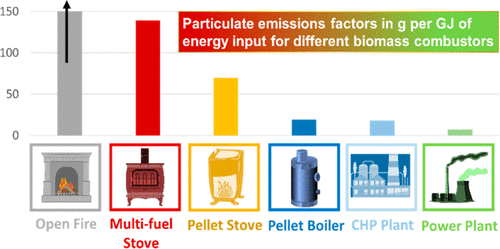当前位置:
X-MOL 学术
›
Energy Fuels
›
论文详情
Our official English website, www.x-mol.net, welcomes your
feedback! (Note: you will need to create a separate account there.)
Air Quality and Climate Impacts of Biomass Use as an Energy Source: A Review
Energy & Fuels ( IF 5.2 ) Pub Date : 2021-07-20 , DOI: 10.1021/acs.energyfuels.1c01523 Alison S. Tomlin 1
Energy & Fuels ( IF 5.2 ) Pub Date : 2021-07-20 , DOI: 10.1021/acs.energyfuels.1c01523 Alison S. Tomlin 1
Affiliation

|
Commitments made to meet the goals of the Paris Agreement, and the need to develop low carbon sources of power and heat, are likely to lead to the continued or even increased use of biomass as an energy source. Biomass is already replacing coal within large scale electricity generation systems. At smaller scales it is utilized within combined heat and power systems, as well domestically for the provision of heat. Unabated, biomass combustion leads to a range of pollutant emissions, including CO, CO2, methane, and black and organic carbon, which are of relevance from a climate perspective, as well as particulate matter, nitrogen oxides, volatile organic compounds, dioxins, furans and precursors of ozone, and secondary organic aerosols, which impact on air quality (AQ) and human health. Epidemiological data suggests that biomass smoke contributes to at least 40 000 premature deaths per year in Europe, as well as negatively affecting respiratory and cardiovascular health. Hence, if biomass is to be used as a future energy source, its AQ impacts need to be addressed. Here, a short review is provided of the potential climate and AQ impacts of the direct use of solid biomass as a fuel for the provision of power and heat. This review provides a brief summary of the chemical and physical characteristics of emissions from biomass utilization for energy provision. The impacts of biomass burning on ambient AQ and health (in particular for fine particulates) are addressed in both outdoor and indoor environments and for industrialized and developing countries. Issues of appliance scale, and how these influence available mitigation options, emissions factors, and regulatory limits for biomass combustors, are discussed. Final perspectives are offered, from the point of view of the need to develop “win–win” strategies for the future utilization of biomass which minimize both climate and air quality impacts.
更新日期:2021-09-16











































 京公网安备 11010802027423号
京公网安备 11010802027423号